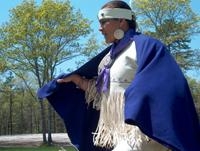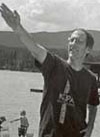
Community Cinema: We Still Live Here (Âs Nutayuneân)
- Library Hall
A very special evening focusing on Native American languages.
Come to a free screening of the PBS Independent Lens documentary "We Still Live Here (Âs Nutayuneân)," followed a talk with University of Colorado/Center of the American West linguistics professor Andrew Cowell talking about "Arapaho Language Preservation: How, and Why?"
The Wampanoag saved the Pilgrims from starvation, and lived to regret it. Spurred on by their celebrated linguist Jane Little Doe Baird, the Wampanoag of Cape Cod and Martha’s Vineyard are reviving their language more than a century after the last native speaker died.
Andrew Cowell studies indigenous languages of the Western U.S., and he directs the Center for the Study of Indigenous Languages of the West. He has published extensively on Arapaho, and his interests include both formal linguistics and linguistic anthropology. He is also involved with language preservation work in the field of endangered languages.
ABOUT THE FILM
WINNER OF THE MOVING MOUNTAINS AWARD AT THE 2011 MOUNTAINFILM IN TELLURIDE FILM FESTIVAL! Âs Nutayuneân tells a remarkable story of cultural revival by the Wampanoag of Southeastern Massachusetts. Their ancestors ensured the survival of the first English settlers in America, and lived to regret it. Now they are bringing their language home again.
The story begins in 1994 when Jessie Little Doe, an intrepid, thirty-something Wampanoag social worker, began having recurring dreams: familiar-looking people from another time addressing her in an incomprehensible language. Jessie was perplexed and a little annoyed– why couldn’t they speak English? Later, she realized they were speaking Wampanoag, a language no one had used for more than a century. These events sent her and members of the Aquinnah and Mashpee Wampanaog communities on an odyssey that would uncover hundreds of documents written in their language, lead Jessie to a Masters in Linguistics at MIT, and result in something that had never been done before – bringing a language alive again in an American Indian community after many generations with no Native speakers.
MORE ABOUT ANDREW COWEL
Andrew Cowell is a Professor of Linguistics at CU-Boulder. He received his BA from Harvard in 1986 and PhD from California-Berkeley in 1993. His research focuses on the connections between language and culture, as well as on language documentation, preservation and revitalization. His primary area of research is the northern Plains area, including Arapaho, Gros Ventre, and Cheyenne, and he has published a grammar of the Arapaho language, an anthology of Arapaho narratives, as well as many articles and curricular materials for the local community. He recently completed a project to document several dozen hours of natural conversation in Arapaho on video, with translations and annotations. He also examines similar research questions in Hawaii and Tahiti, and speaks Arapaho, Hawaiian and Tahitian.
WATCH THE TRAILER FOR WE STILL LIVE HERE
RUN TIME: 60 min. film, followed by a talk with Andrew Cowell
ABOUT COMMUNITY CINEMA
Community Cinema is a groundbreaking public education and civic engagement initiative featuring free monthly screenings of films from the Emmy Award-winning series Independent Lens. Community Cinema is on location in more than 95 cities nationally, bringing together leading organizations, community members, and public television stations to learn, discuss, and get involved in key social issues of our time.
ABOUT ITVS
The Independent Television Service (ITVS) brings independently-produced, high-quality public broadcast and new media programs to local, national and international audiences. The independent producers who create ITVS programs take creative risks, tackle complex issues and express points of view seldom explored in the mass media. ITVS programs enrich the cultural landscape with the voices and visions of underrepresented communities, and reflect the interests and concerns of a diverse society. www.itvs.org
Made possible by a partnership with Rocky Mountain PBS.















